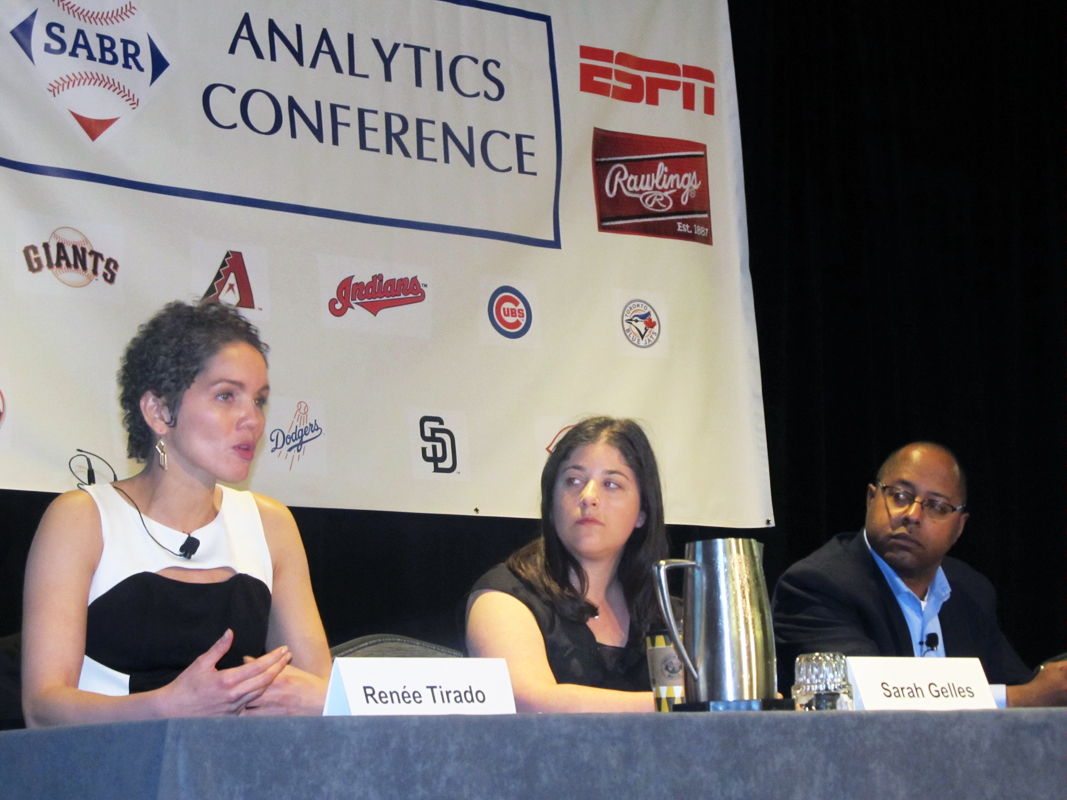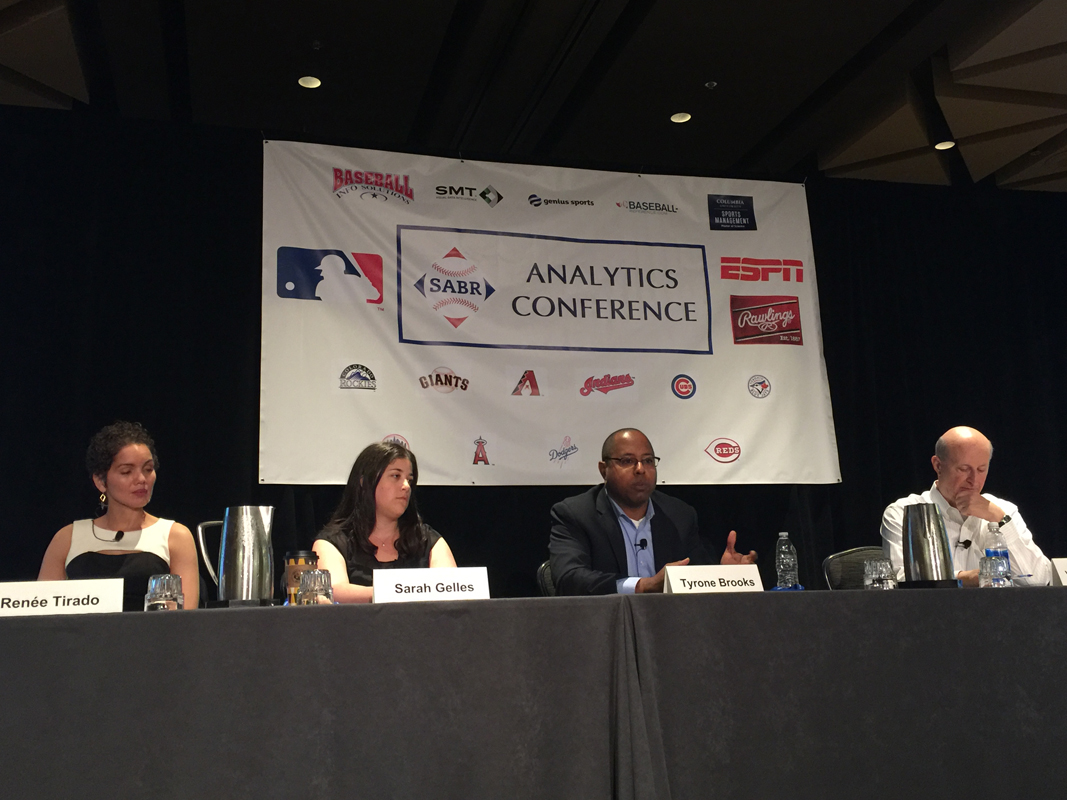2017 SABR Analytics: Diversity in Baseball Panel
At the sixth annual SABR Analytics Conference on March 11, 2017, in Phoenix, our Diversity in Baseball Panel discussed ways to open up opportunities to
Our panel included Tyrone Brooks, Senior Director of Major League Baseball’s Front Office & Field Staff Diversity Pipeline Program; Renée Tirado, Senior Director of Recruitment for Major League Baseball; Sarah Gelles, Director of Analytics for the Baltimore Orioles; and moderator Vince Gennaro, SABR President.
- Audio: Click here to listen to the Diversity in Baseball Panel (MP3; 53:55)
 Here are some highlights from the Diversity in Baseball Panel:
Here are some highlights from the Diversity in Baseball Panel:
ON MAJOR LEAGUE BASEBALL’S EFFORTS TO INCREASE DIVERSITY
- Brooks: “With the Diversity Pipeline Program, as Major League Baseball looked at where executives were [coming from], especially with general manager jobs and managerial jobs, we started wondering where is the talent? We didn’t have a fully developed pipeline that was in place. So we looked at ways at how we could increase that pool. This is about finding qualified individuals that have a passion for baseball, that want to learn, to come into the industry and grow long-term. A big part of that is also talking at the clubs and the structure of their own environments, including the hiring processes. So we’re looking at ways we can reach out to more diverse audiences, that individuals know working in baseball is an option. Part of that is educating and informing people that you don’t have to play [but] you can still have an opportunity to work in the game.”
ON RETAINING TALENT WITH DIVERSE BACKGROUNDS
- Tirado: “[A friend and I] both left a law firm that was predominantly white male, there were no female partners, because I didn’t have anyone to model after. There was no one for me to go to. … This diversity conversation is not unique [to baseball]]. It’s happening across the board. It’s a war on talent, but it’s also a war on retention because we’re trying to keep those diverse perspectives in the workplace. And it’s very hard [for employees] to find that connectivity to a company, to stay loyal and feel like you have a place for you to grow, [if you don’t] have something aspirational [to look to]. … This is not about the feel-good, this is about the bottom line.”
ON ADVICE TO HIRING MANAGERS
- Tirado: “The biggest thing we can tell anybody is to take people along with you, expand your own personal networks, get a comfort level with different perspectives. … We all have biases and it gets played out in different ways. This is not just racial, this is not just about gender. I have clients who will only look at resumes and hire from schools that they went to. That’s a limitation on diversity and on inclusion. I would challenge everyone in this room, whether you’re a manager now or a future manager, as you’re moving up the ladder and making decisions, have a little bit of self-reflection and manage those biases in your decisions. Bring other people, mentor other people who don’t necessarily look like you, who might have a different perspective — don’t be afraid of that, don’t resist that. And it’s been proven that will help you win more in the long run.”
- Gelles: “One thing I wish managers would do more is to, early on, address the issue. Don’t pretend that everyone’s the same. Sometimes you don’t want to single someone out, or call attention to their gender or race or whatever it is, but I think it’s important to get it on the table as something that can be discussed. A lot of people don’t know what issues their employees are going to face if they haven’t been there themselves. So that employee needs to feel comfortable bringing an issue to your attention that you may not have thought of. … Maybe there’s a meeting in the coaches’ [office] and you tell your female employee she’s welcome to attend, but you may not realize that requires her to walk through the locker room and she may not know if she’s allowed to go in there. So being able to have a space where she can say, ‘Hey, can I walk down with you because of this?’ That goes a long way to making people feel comfortable, and that’s the only way people are going to do their best work.”
 ON SUPPORT SYSTEMS IN THE WORKPLACE
ON SUPPORT SYSTEMS IN THE WORKPLACE
- Gennaro: “For many of us in the room who are white males, it is difficult to fully appreciate and empathize what it is like to be in a diverse workplace as a minority. I think of all the times I had struggles in my workplace at PepsiCo, and I was able to walk down the hall into the next office, or the one after that, or the one after that, and see someone like me. I could sit down with them and talk with them about what I was dealing with, they would tell me what they were dealing with, and [there was] an immediate relatability because they looked like me, they felt like me. Yeah, they might have looked at the world differently but they were still from the same system that I grew up in.”
- Brooks: “When I was with the [Atlanta] Braves, there were not many people who looked like me in our baseball operations. … One of the best sets of advice I got when I first started was from somebody who had moved on to a different organization and [made] an effort to come back when I first became a full-time employee, and that was very important to me just from the start having that type of [support]. … But also [we had] people like Dayton Moore, who was such a mentor to me even though he was coming from a different background. He was willing to share and give me feedback on what I needed to improve on to help me along the way.”
- Gelles: “There aren’t that many women, so it was pretty clear early on, at least in baseball there weren’t going to be many people who looked like me. For me, it’s about having a support network outside of the game. Renee is an attorney, and I have a lot of friends who have gone that route … and it’s really not all that different than it is in baseball. Just having people you can vent to outside of the game can be helpful as well.”
For more coverage of the 2017 SABR Analytics Conference, visit SABR.org/analytics.
Originally published: March 15, 2017. Last Updated: July 27, 2020.


